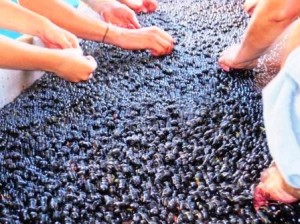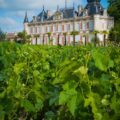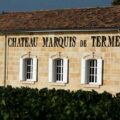Chateau Marquis d’Alesme is a contender for the best value in Margaux wine today. With its gravel, clay and limestone terroir and reliance on Cabernet Sauvignon, the property is capable of making very good wine. In fact, their 2010 Bordeaux is the finest wine I’ve ever tasted from the estate. There are numerous reasons for this. Marquis d’Alesme has a new owner who has made the commitment to produce the best wine possible at the estate. They recently added Michel Rolland to their team as their consultant. This is a property to to watch. We spoke with Marjolaine de Coninck about the 2011 Bordeaux vintage.
Jeff Leve What is the biggest challenge for you at the moment at Chateau Marquis d’Alesme Becker?
Marjolaine Maurice de Coninck “The biggest challenge today is to rapidly give to Marquis the best range it can have, due to its terroir. We never forget that most 1855 Classified Growths work really hard and they’re making better wine all the time! Plus, most of those estates are already very famous. We need to work hard and quickly so we can hit our target!”
Jeff Leve: How would you describe the 2011 Marquis d’Alesme growing season in Margaux?
Marjolaine Maurice de Coninck “The 2011 Marquis d’Alesme vintage was unusual growing season that was so dry and hot in the spring. It was really interesting then to see how vines were able or not to accept that. Each vintage is different; 2011 will be really different only by this point”.
Jeff Leve: Was 2011 Marquis d’Alesme a much harder vintage to produce for you than 2010 or 2009?
Marjolaine Maurice de Coninck “Yes, 2011 Bordeaux is a much more difficult vintage than 2010 Bordeaux to work with. This is because after an unusual hot and dry spring, we waited for a normal summer, which only began at the start of September”.
Jeff Leve: When did you start and finish your 2011 Bordeaux harvest?
Marjolaine Maurice de Coninck “The first day of picking was September 19 with the Merlot. We picked our Petit Verdot, September 26 and finished our harvest, October 4 with the Cabernet Sauvignon. For us, this was not an especially, early vintage in Margaux”.
Jeff Leve: How would you describe the 2011 growing season in Bordeaux?
Marjolaine Maurice de Coninck “2011 Bordeaux is the product of an unusual growing season with a dry and hot spring. It was really interesting to see how the vines were able or not to accept that. Each vintage is different. 2011 will be really different because of those weather patterns”.
Jeff Leve: Did the drought present you with any unique challenges during he 2011 Bordeaux harvest?
Marjolaine Maurice de Coninck “Yes. The vines were tired at beginning of September. It was a challenge for us to accept the fact that we had to wait longer than we anticipated. We waited, hoping to get good weather to obtain the ripeness we needed. This was important. But the young vines and some of our other plots were not able to wait. That is why it was so important for us to go into every plot on a daily basis to help us decide when to pick our grapes”.
Jeff Leve: With 2011 Bordeaux was botrytis something you had to worry about in Margaux?
Marjolaine Maurice de Coninck “Yes of course! We know that the rot risk was more this year because of the conditions during flowering. But with a lot of effort in the vineyard and with green harvesting, it was easy to control it”.
Jeff Leve: How much sorting was involved with the 2011 Bordeaux harvest?
Marjolaine Maurice de Coninck “A lot! I worked with teams on sorting and selecting tables in the vineyards and in the reception to make sure we obtained the best selection possible. It was hard work, but necessary”.
Jeff Leve: What yields do you expect this year?
Marjolaine Maurice de Coninck “The July rains arrived at a time that made the yield! We should have 38 hl/ha”.
Jeff Leve: What specific choices will you need to make during the vinification for your 2011 Bordeaux?
Marjolaine Maurice de Coninck “We are doing a long, slow and cool extraction. We have to take care to remember 2006”.
Jeff Leve: What happened with the 2006 Bordeaux wines?
Marjolaine Maurice de Coninck “We did a hard extraction in 2006. That year, we extracted too much tannin. This created dryness in the wines. Today we know what happened. 2006 and 2011 have a very high level of potential tannins, which means we need to be careful during the extraction”.
Jeff Leve: With this in mind, what will you do this year?
Marjolaine Maurice de Coninck “Because 2011 has a high level of color and tannins, we really need to retain the richness to create a fleshy and well balanced wine. Along with a slow, cooler extraction, we’ll also modify our barrel ageing program to help reach this target”.
Jeff Leve: Do you use the same vinification techniques at Marquis d’Alesme and Labegorce?
Marjolaine Maurice de Coninck “At Marquis d’Alesme, we perform a longer, warmer macération to help obtain more structure. This is different than what we do with the wines from Labegorce. This is due to the fact that Marquis d’Alesme is a grand Cru classé, which needs that additional structure to be able to age and evolve for 30 years”.
Jeff Leve: Can you describe the style of your 2011 Bordeaux wines?
Marjolaine Maurice de Coninck “Our wines have a high level of tannin with good balance and color. In more recent vintages, like 2009, we had low acidity. 2011 has a higher acidity level than 2010. This is a good point for the ageing time that the wine will allow”.
Jeff Leve: Can you please share some technical information on your potential alcohol levels, pH and IPT numbers?
Marjolaine Maurice de Coninck “We will reach around 13° alcohol. The pH is between 3.6 and 3.8. Our IPT numbers range from 90 to 110!”





